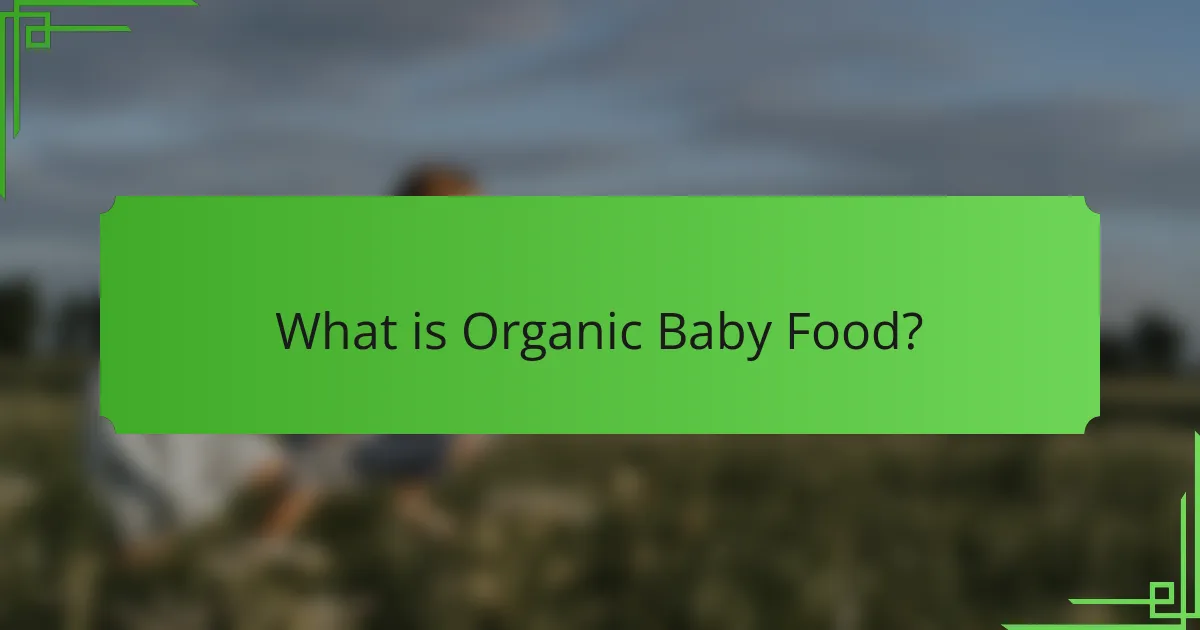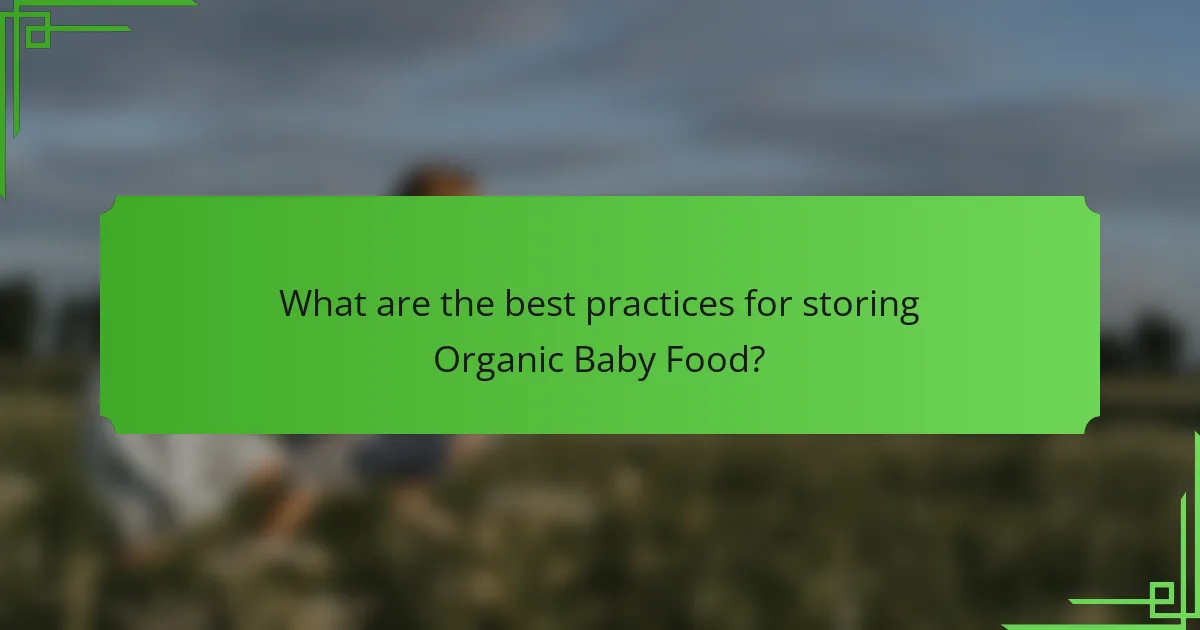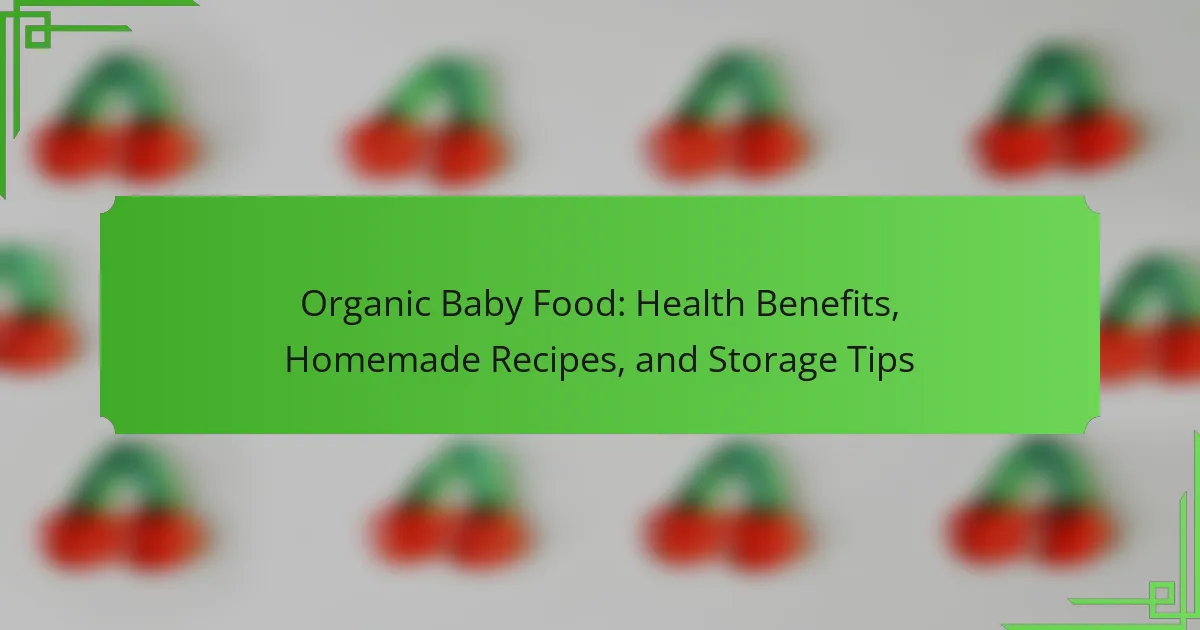Organic baby food consists of ingredients cultivated without synthetic pesticides or fertilizers, specifically tailored for infants and young children. This type of food aims to provide a nutritious option free from harmful chemicals, and many parents prefer it for its potential health benefits, including higher nutrient levels and environmentally friendly farming practices. The article covers the preparation of homemade organic baby food, detailing steps for selecting, cooking, and storing organic ingredients to ensure freshness and safety. Additionally, it offers essential storage tips to maintain the quality and nutritional value of organic baby food, emphasizing proper refrigeration and freezing methods.

What is Organic Baby Food?
Organic baby food is food made from ingredients that are grown without synthetic pesticides or fertilizers. It is designed specifically for infants and young children. Organic baby food aims to provide a nutritious option free from harmful chemicals. Many parents choose organic baby food to ensure a healthier diet for their children. Studies indicate that organic foods can have higher levels of certain nutrients. Additionally, organic farming practices are often better for the environment. Organic baby food can come in various forms, including purees and finger foods. These products are often labeled to indicate their organic certification.
Why is Organic Baby Food important for infants?
Organic baby food is important for infants because it minimizes exposure to harmful pesticides and additives. Infants have sensitive digestive systems. Organic food is grown without synthetic fertilizers or chemicals. This reduces the risk of potential health issues. Research indicates that organic foods can have higher levels of certain nutrients. A study published in the British Journal of Nutrition found higher antioxidant levels in organic produce. Additionally, organic baby food often contains fewer preservatives. This can lead to better health outcomes for infants. Choosing organic options supports sustainable farming practices as well.
What distinguishes organic baby food from conventional baby food?
Organic baby food is made from ingredients that are grown without synthetic pesticides and fertilizers. Conventional baby food often contains these chemicals. Organic foods must meet specific USDA standards for farming practices. These standards include crop rotation and soil health. Additionally, organic baby food is not allowed to contain genetically modified organisms (GMOs). In contrast, conventional baby food may include GMOs. Many parents choose organic baby food for perceived health benefits. Research indicates that organic produce may have higher antioxidant levels.
How is organic baby food regulated and certified?
Organic baby food is regulated and certified by national and international standards. In the United States, the USDA establishes the guidelines for organic food production. These guidelines require that organic baby food must contain at least 95% organic ingredients. The remaining 5% can include non-organic ingredients from an approved list.
Certification involves a third-party verification process. This process ensures that producers comply with organic farming practices. The certification must be renewed annually. In addition, manufacturers must maintain detailed records of their ingredients and production methods.
The European Union has similar regulations for organic baby food. EU regulations mandate that organic products meet strict criteria for farming and processing. Compliance with these regulations is verified through inspections and documentation.
These regulatory frameworks help ensure the safety and quality of organic baby food for consumers.
What are the key health benefits of Organic Baby Food?
Organic baby food offers several key health benefits. It is made from ingredients free of synthetic pesticides and fertilizers. This reduces the risk of chemical exposure for infants. Organic baby food typically contains more nutrients. Studies show that organic produce can have higher levels of antioxidants. These antioxidants are beneficial for a baby’s developing immune system. Organic baby food is less likely to contain harmful additives or preservatives. This contributes to better overall health and digestion. Parents can feel confident about the quality and safety of organic options.
How does organic baby food contribute to a child’s development?
Organic baby food contributes to a child’s development by providing essential nutrients without harmful chemicals. These foods are often richer in vitamins and minerals compared to conventional options. Organic baby food typically contains higher levels of antioxidants, which support immune function. A study by the Journal of Nutrition found that organic produce has significantly higher antioxidant content. Furthermore, organic baby food is free from synthetic pesticides and fertilizers, reducing exposure to harmful substances. This purity helps foster healthy growth and cognitive development in infants. Research indicates that a balanced diet in early childhood is crucial for long-term health. Organic baby food can also enhance digestive health due to natural ingredients and fiber content.
What nutritional advantages does organic baby food provide?
Organic baby food provides higher nutritional value compared to conventional options. It typically contains more vitamins and minerals due to the use of organic farming practices. Organic foods are grown without synthetic pesticides and fertilizers, which can lead to healthier crops. Studies indicate that organic produce can have up to 30% more antioxidants. These compounds are essential for a baby’s developing immune system. Additionally, organic baby food is less likely to contain harmful additives or preservatives. This contributes to a cleaner diet for infants. Parents often choose organic options to support better overall health for their children.
Why might organic baby food reduce exposure to harmful substances?
Organic baby food might reduce exposure to harmful substances due to the absence of synthetic pesticides and fertilizers. Organic farming practices prioritize natural growth methods. This minimizes chemical residues that can be harmful to infants. Studies show that organic produce contains lower levels of heavy metals and pesticide residues. For instance, a study published in the British Journal of Nutrition found that organic fruits and vegetables had significantly lower pesticide levels compared to conventional ones. Additionally, organic baby food often avoids artificial preservatives and additives. This further reduces the risk of exposure to potentially harmful substances. Overall, choosing organic baby food can provide a safer dietary option for infants.

How can I prepare Homemade Organic Baby Food?
To prepare homemade organic baby food, start by selecting fresh organic fruits or vegetables. Wash them thoroughly to remove any dirt or pesticides. Next, peel and chop the produce into small pieces for easier cooking. Steam or boil the chopped pieces until they are soft. This typically takes about 10 to 15 minutes, depending on the type of food. After cooking, blend the soft produce in a food processor until smooth. You can add water or breast milk to achieve the desired consistency. Store the prepared baby food in airtight containers. Homemade organic baby food can be refrigerated for up to three days or frozen for up to three months. This method ensures that your baby receives fresh, nutritious food without additives.
What ingredients are best for making homemade organic baby food?
The best ingredients for making homemade organic baby food include fruits, vegetables, grains, and proteins. Common fruits are bananas, apples, and avocados. Popular vegetables include sweet potatoes, carrots, and peas. Whole grains like brown rice and oats can provide essential nutrients. Protein sources such as lentils and beans are also beneficial. Organic ingredients ensure the absence of pesticides and harmful chemicals. Using fresh, seasonal produce enhances flavor and nutritional value. These ingredients can be pureed or mashed to create smooth textures suitable for babies.
How do I select fresh, organic produce for baby food?
Select fresh, organic produce for baby food by checking for firmness and vibrant color. Look for produce without blemishes or soft spots. Choose items that are in season for optimal freshness. Organic certification ensures no harmful pesticides were used. Local farmers’ markets often have fresh, organic options. Washing produce thoroughly removes any surface contaminants. Use a variety of fruits and vegetables to provide balanced nutrition. These practices ensure high-quality ingredients for baby food.
What are some essential tools for preparing homemade baby food?
Essential tools for preparing homemade baby food include a blender, food processor, or immersion blender for pureeing ingredients. A steamer basket is useful for cooking fruits and vegetables while preserving nutrients. Measuring cups and spoons ensure accurate ingredient portions. A fine mesh strainer helps achieve a smooth texture if needed. Ice cube trays are great for freezing portions for later use. Lastly, storage containers with airtight lids are important for keeping food fresh. These tools facilitate the preparation of nutritious and safe baby food at home.
What are some simple recipes for Homemade Organic Baby Food?
Homemade organic baby food can be made easily with fresh ingredients. One simple recipe is pureed carrots. Steam chopped organic carrots until tender. Blend them with a little water until smooth. Another recipe is mashed bananas. Simply mash ripe organic bananas with a fork until creamy. For apple sauce, peel and chop organic apples. Cook them until soft, then blend or mash. Sweet potatoes can also be used. Bake or steam organic sweet potatoes, then mash or blend until smooth. These recipes are nutritious and free from preservatives. They provide essential vitamins and minerals for growing babies.
How do I make pureed fruits for my baby?
To make pureed fruits for your baby, start by selecting ripe fruits such as bananas, apples, or pears. Wash the fruits thoroughly to remove any dirt or pesticides. Peel and core the fruits if necessary. Cut the fruits into small pieces to ensure even cooking. Steam or boil the fruit pieces until they are soft, usually for about 5-10 minutes. Once cooked, transfer the fruit to a blender or food processor. Blend until smooth, adding water or breast milk to achieve the desired consistency. Store the pureed fruits in airtight containers in the refrigerator for up to 3 days or freeze for longer storage.
What are the steps to prepare vegetable purees?
To prepare vegetable purees, start by selecting fresh vegetables. Wash the vegetables thoroughly to remove any dirt. Peel the vegetables if necessary, depending on the type. Cut the vegetables into small, even pieces for uniform cooking. Cook the vegetables by steaming or boiling until they are tender. Drain any excess water after cooking. Blend the cooked vegetables in a food processor or blender until smooth. Add water, broth, or oil gradually to achieve the desired consistency.
How can I create balanced meals using grains and proteins?
To create balanced meals using grains and proteins, combine whole grains with high-quality protein sources. Whole grains like quinoa, brown rice, or oats provide essential carbohydrates and fiber. Proteins can include beans, lentils, chicken, or fish, which supply necessary amino acids. For example, a meal could consist of quinoa mixed with black beans and vegetables. This combination offers a complete amino acid profile. Studies show that meals with balanced nutrients support better growth and development in children. Therefore, pairing grains with proteins ensures a nutritious diet for babies.

What are the best practices for storing Organic Baby Food?
Store organic baby food in airtight containers to prevent spoilage. Refrigerate homemade baby food within two hours of preparation. Consume refrigerated baby food within 48 hours for optimal freshness. Freeze portions in ice cube trays for longer storage, transferring them to freezer bags once solid. Label containers with dates to track freshness. Avoid refreezing thawed baby food to maintain quality. Always check for signs of spoilage before serving, such as unusual odor or color changes. Following these practices ensures safety and preserves nutritional value.
How should I store homemade organic baby food to ensure freshness?
Store homemade organic baby food in airtight containers. Glass jars or BPA-free plastic containers work well. Label each container with the date of preparation. Refrigerate any unused portions immediately. Homemade baby food can last up to 48 hours in the refrigerator. For longer storage, freeze the food in ice cube trays. Once frozen, transfer cubes to a freezer bag. This method preserves freshness for up to three months. Always thaw food in the refrigerator before serving. Avoid refreezing thawed baby food to maintain quality.
What containers are ideal for storing baby food?
Glass containers and BPA-free plastic containers are ideal for storing baby food. Glass containers are non-toxic and do not leach chemicals. They are also microwave and dishwasher safe. BPA-free plastic containers are lightweight and durable. They provide convenience for on-the-go feeding. Both types can be sealed tightly to maintain freshness. Using airtight containers helps prevent spoilage. Research shows that proper storage can extend the shelf life of homemade baby food.
How long can I safely store homemade organic baby food?
Homemade organic baby food can be safely stored in the refrigerator for up to 3 days. If frozen, it can last for about 3 to 6 months. Proper storage is crucial to maintain freshness and prevent spoilage. Use airtight containers to keep the food safe. Always label containers with the date of preparation. This helps track storage time effectively. Following these guidelines ensures your baby food remains safe for consumption.
What tips can help me when transitioning to Organic Baby Food?
Start by introducing organic baby food gradually. Mix it with familiar foods to help your baby adjust. Choose single-ingredient organic foods first, such as pureed fruits or vegetables. This allows you to monitor for allergies. Gradually introduce new flavors and textures over time. Offer a variety of organic options to encourage diverse eating habits. Always check for organic certifications on packaging. Homemade organic baby food can be nutritious and cost-effective. Store homemade food in airtight containers to maintain freshness.
How can I introduce organic baby food to my child’s diet?
Introduce organic baby food gradually into your child’s diet. Start by offering small amounts of pureed organic fruits or vegetables. Choose single-ingredient foods to monitor for allergies. Begin with mild flavors like apples or sweet potatoes. Wait three to five days before introducing a new food. This helps identify any adverse reactions. Make sure to use fresh, organic ingredients. Homemade organic baby food can be nutritious and free from additives. Studies show that introducing organic foods can reduce pesticide exposure.
What should I watch for when my baby tries new organic foods?
Watch for allergic reactions when your baby tries new organic foods. Symptoms may include rashes, swelling, or difficulty breathing. Introduce one new food at a time to monitor for any adverse effects. Observe for digestive issues like gas or diarrhea, which can indicate intolerance. Ensure the food is age-appropriate and properly prepared to avoid choking hazards. Consult a pediatrician if you notice any concerning symptoms. Research shows that introducing diverse foods can improve a child’s palate and nutrition (American Academy of Pediatrics).
What are common troubleshooting tips for preparing Organic Baby Food?
Common troubleshooting tips for preparing organic baby food include ensuring proper ingredient selection and preparation. Use fresh, organic fruits and vegetables to avoid pesticides. Wash all produce thoroughly to remove dirt and contaminants. Cook ingredients until soft to aid blending. If the mixture is too thick, add water or breast milk to achieve desired consistency. For flavor, introduce spices gradually, avoiding salt and sugar. Store leftovers in airtight containers to maintain freshness. Always check for spoilage before serving. These practices help ensure safety and quality in homemade organic baby food.
Organic baby food is specifically designed for infants and young children, made from ingredients grown without synthetic pesticides or fertilizers. This article covers the health benefits of organic baby food, including reduced exposure to harmful substances and higher nutrient levels. It also provides guidance on preparing homemade organic baby food, selecting fresh ingredients, and best storage practices to maintain quality and safety. Additionally, it outlines the importance of organic certification and offers simple recipes to ensure a nutritious diet for growing babies.
